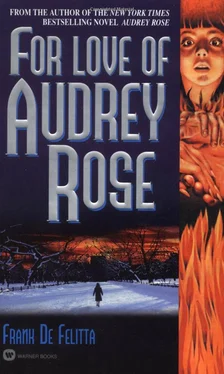The mere thought made Janice’s head dizzy. The South conjured up an unpleasant image, vague but festering with gross jungle growth, animals like baboons, villages with dysentery.
“Do you have money?” he asked.
“I can change some more.”
“Good. You can fly to Mysore City. I will show you what to do after that. I only wish I could go with you. Elliot and I have a firm friendship.”
Mehrotra led her into his shop. He shoved several volumes of Schopenhauer, Hume, and Tagore onto the floor. Several notebooks he pushed more gently onto his chair. From a drawer he extracted an ancient atlas printed in German, and paged through the faded color areas.
“This is the Cauvery River,” Mehrotra said matter-of-factly. “It is like the Ganges, a holy river.”
Janice watched, fascinated as the lean brown finger traced the path southeast from Mysore City into the mountains and then to the valley of the upper Cauvery.
“You see? Not so far,” he said smoothly. “From Mysore City there is a train. To Kotagiri. Then you must take a bus — I will write down its name — going east toward Erode, then it goes south. Right here”—he indicated an area where few village names were inscribed on the map—“is the ashram. ”
The empty area on the old map looked intimidating. There were German phrases in parentheses which seemed to indicate the central mountains were poorly explored.
“How do I know when I get to the ashram ?” she finally asked.
“It is a Hindu temple and it is dedicated to Tejo Lingam —the fire incarnation of God. I can write that down for you.”
Mehrotra sat at his desk and in a lovely calligraphy wrote out the name of the ashram. On a separate sheet of paper, he wrote a brief description of the ashram’ s location, in various languages.
“In case nobody speaks English, just show them this,” he said, handing her the letter. “But pilgrims go there all the time. You will have no difficulty.”
Janice gingerly took the letter. She folded it and put it carefully into her handbag. For a long time, she looked at the gleaming brassware on curved trays, many hanging from silver chains over the shop.
“Please tell Elliot that I—” Mehrotra faltered. “That I have been unable to come this year, but that I look forward to seeing him again in Benares.”
Moved by the depth of his feeling, Janice agreed. She thanked him, they shook hands, then Janice stood up. Mehrotra looked very sad.
“You will have good luck. I will pray for you.”
She smiled, waved good-bye as she stepped away, and it was only when she reached the empty boulevards of the residential area that the anxiety returned. She stepped resolutely into the hotel.
I need to fly to Mysore City,” she told the desk clerk. “Can you connect me with the proper airline?”
“Mysore City?” he asked, raising an eyebrow. “Of course.”
In fifteen minutes, all was set. At 9:55 in the morning, a plane would leave, stopping only once at Hyderabad. Trains for Kotagiri left only twice daily, but there seemed to be an hour for her to make the connection, provided she reserve a seat immediately. She did so, through the clerk, and he advised her to wait until they reached Kotagiri before attempting to locate the proper bus.
“Mrs. Templeton,” the desk clerk asked, in a changed tone of voice.
“Yes?”
“Excuse me, but why are you going to such a place?”
“To visit an ashram. ”
“But there are plenty of ashrams, much more famous, much more beautiful.”
Janice looked at him quizzically. The desk clerk cleared his throat.
“What I mean to suggest, Mrs. Templeton, is that this area has been under attack.”
“Attack?”
“Not exactly attack. One should say, a small rebellion. Really, they are only bandits with a flag, but still, I would advise you…”
“Is the area unsafe?”
“Not exactly unsafe. Only there are no conveniences. The post offices are not reliable. There is no television. Even the telephones are a matter of good karma. ”
He laughed feebly at his own witticism. Janice smiled.
“Thank you,” she said. “I’ll be very careful.”
“If I could advise you…?”
“Yes. Please do.”
“When you go south of Kotagiri, do not travel at night.”
“Thank you,” Janice said, smiling graciously. “Good night.”
She slept well, considering that she felt she had just walked off a gangplank. All decisions had been made. If not tomorrow night, then the night after, she would finally see Elliot Hoover. Surely he would know the trials she had gone through to see him. Kindness was the core of his being. That alone would force him to respond, to help them. And if he didn’t?
Mercifully, sleep came before an answer did.
This time the flight seemed to last days, not hours. It was late afternoon when she touched down at Mysore City. It was early evening by the time she secured her seat on the train. The night was sultry, and it smelled like stagnant water.
It was not until 10:45 that the train chugged unevenly into the dirty town of Kotagiri. Remembering what the desk clerk in Benares had recommended, and longing for a clean bath and some sleep, Janice went in search of a tourist office. It was closed. There were no taxis.
She carried her small suitcase down the street. A small “hotel” sign blinked on and off. No answer. She knocked again. A sound of muffled steps. A man in a dirty undershirt looked out at her, blinking in surprise.
“One night,” Janice said, holding up a single finger, gesturing sleep.
The man nodded. Janice entered the hotel and instantly regretted it. It smelled of stale beer and urine. Outside, Kotagiri looked even worse. The man closed the door. From his desk, he pulled out a battered ledger, turned on a small amber desk lamp and pulled out a black fountain pen, carefully shaking it three times. He wrote out the cost and handed it to her on a slip of paper.
Janice paid him the rupees. He seemed surprised that she did not argue. He beckoned her to follow, and they went up a narrow staircase. Her room was barely wide enough for the bed and standing room. The bathroom was down the hall.
As she undressed, she smelled the changed atmosphere in the South. It was impregnated with rain, and yet the rain remained in the clouds. Unwilling to bathe in the dirty bathroom, she washed standing up at the cracked basin. Mrs. Templeton, she thought wryly to herself, you have stayed in fleabag hotels in your time, but this one not even a self-respecting flea would come to.
On the street below, a police car drove by, and behind it a dark convoy truck with about ten soldiers bumping along in the back, rifles pointed up.
Janice felt reluctant to climb into the sheets. The smell of rain increased, and several times Janice looked out the window. Rain would have been lovely since it would have broken up the pressure in the atmosphere. But each time she looked, it was the identical dusty, caked iron railing that she saw. Perspiring in the hot night, she fell into an uncomfortable sleep. In the morning, she needed something to drink, but she refused to touch the water from the tap. At the bus station, not far from the train station, she bought a warm bottle of Coca-Cola.
The morning was overcast and even more humid. A bright, painful haze was scattered over Kotagiri, so that nobody cast shadows. It was all subsumed in the overcast heaviness of a rain-filled sky that did not rain. Janice waited in line behind short, round-limbed men who argued excitedly among themselves. She was reminded of Mexico, the relaxed pace of life that had something lethal in it.
She showed her note to the man behind the ticket cage. He wrote out the cost with a contemptuous air, and she paid. At 11:25 there was an announcement over the loudspeaker; the ticket seller waved to get her attention, then pointed to the bus coughing smoke outside. Janice emerged into the main yard, followed the dark-coated men into the bus, and sat down in the back. As the bus pulled away, a few spires rose into view, and some leafy streets, but Janice hoped she would never again see Kotagiri for the rest of her life.
Читать дальше












